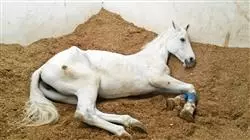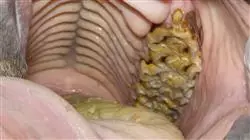University certificate
The world's largest faculty of veterinary medicine”
Introduction to the Program
You will learn to develop and advance in depth in the diseases that affect the digestive tract from the stomach to the rectum, assessing the stage of the pathologies that appear"

The pathologies of the different vital systems can present themselves in different ways in equine patients, from the horse's mood to anomalies that may appear in its body. However, the veterinarian's duty is to ensure the equine's safety, which is why through this program the professional will be able to identify which are and how to treat diseases and affections in the vital systems.
Nowadays, the most determinant proven factor for the appearance of problems in equines is given by the context in which the animal lives; to what use it is destined, what type of feeding it receives, as well as the management and stabling conditions.
Nutritional management and preventive medicine will play a decisive role in the treatment of the horse, so it is of vital importance to know the different cares in those affected areas.
In short, this Postgraduate diploma will provide up-to-date information on how to use the most advanced diagnostic and therapeutic tools, adapting them to the possibilities in the field. It will address the main pathologies and conditions affecting the horse, as well as recovery and prevention techniques.
Join the elite, with this highly effective educational program and open new paths to help you advance in your professional progress"
This Postgraduate diploma in Horse Vital Systems contains the most complete and up-to-date program on the market. The most important features include:
- The latest technology in online teaching software
- A highly visual teaching system, supported by graphic and schematic contents that are easy to assimilate and understand
- Practical cases presented by practising experts
- State-of-the-art interactive video systems
- Teaching supported by telepractice
- Continuous updating and recycling systems
- Autonomous learning: full compatibility with other occupations
- Practical exercises for self-evaluation and learning verification
- Support groups and educational synergies: questions to the expert, debate and knowledge forums
- Communication with the teacher and individual reflection work
- Content that is accessible from any fixed or portable device with an Internet connection
- Supplementary documentation databases are permanently available, even after finishing the course
A comprehensive program that will allow you to acquire the most advanced knowledge in all the fields of intervention of the Equine Veterinarian"
Our teaching staff is made up of professionals from different fields related to this specialty. In this way, we ensure that we provide you with the educational update we are aiming for. A multidisciplinary team of professionals prepared and experienced in different environments, who will develop the theoretical knowledge in an efficient way, but, above all, will put at your service the practical knowledge derived from their own experience: one of the differential qualities of this program.
This mastery of the subject matter is complemented by the effectiveness of the methodological design. Developed by a multidisciplinary team of e-Learning experts, it integrates the latest advances in educational technology. In this way, you will be able to study with a range of easy-to-use and versatile multimedia tools that will give you the necessary skills you need for your specialization.
The design of this program is based on Problem-Based Learning: an approach that views learning as a highly practical process. To achieve this remotely, we will use telepractice learning: with the help of an innovative interactive video system, and learning from an expert, you will be able to acquire the knowledge as if you were actually dealing with the scenario you are learning about. A concept that will allow you to integrate and fix learning in a more realistic and permanent way.
With the experience of active professionals and the analysis of real cases of success, in a high impact scientific approach"

A comprehensive and total update in Horse Vital Systems with the most complete and effective scientific program on the online teaching market"
Why study at TECH?
TECH is the world’s largest online university. With an impressive catalog of more than 14,000 university programs available in 11 languages, it is positioned as a leader in employability, with a 99% job placement rate. In addition, it relies on an enormous faculty of more than 6,000 professors of the highest international renown.

Study at the world's largest online university and guarantee your professional success. The future starts at TECH”
The world’s best online university according to FORBES
The prestigious Forbes magazine, specialized in business and finance, has highlighted TECH as “the world's best online university” This is what they have recently stated in an article in their digital edition in which they echo the success story of this institution, “thanks to the academic offer it provides, the selection of its teaching staff, and an innovative learning method aimed at educating the professionals of the future”
A revolutionary study method, a cutting-edge faculty and a practical focus: the key to TECH's success.
The most complete study plans on the university scene
TECH offers the most complete study plans on the university scene, with syllabuses that cover fundamental concepts and, at the same time, the main scientific advances in their specific scientific areas. In addition, these programs are continuously being updated to guarantee students the academic vanguard and the most in-demand professional skills. In this way, the university's qualifications provide its graduates with a significant advantage to propel their careers to success.
TECH offers the most comprehensive and intensive study plans on the current university scene.
A world-class teaching staff
TECH's teaching staff is made up of more than 6,000 professors with the highest international recognition. Professors, researchers and top executives of multinational companies, including Isaiah Covington, performance coach of the Boston Celtics; Magda Romanska, principal investigator at Harvard MetaLAB; Ignacio Wistumba, chairman of the department of translational molecular pathology at MD Anderson Cancer Center; and D.W. Pine, creative director of TIME magazine, among others.
Internationally renowned experts, specialized in different branches of Health, Technology, Communication and Business, form part of the TECH faculty.
A unique learning method
TECH is the first university to use Relearning in all its programs. It is the best online learning methodology, accredited with international teaching quality certifications, provided by prestigious educational agencies. In addition, this disruptive educational model is complemented with the “Case Method”, thereby setting up a unique online teaching strategy. Innovative teaching resources are also implemented, including detailed videos, infographics and interactive summaries.
TECH combines Relearning and the Case Method in all its university programs to guarantee excellent theoretical and practical learning, studying whenever and wherever you want.
The world's largest online university
TECH is the world’s largest online university. We are the largest educational institution, with the best and widest online educational catalog, one hundred percent online and covering the vast majority of areas of knowledge. We offer a large selection of our own degrees and accredited online undergraduate and postgraduate degrees. In total, more than 14,000 university degrees, in eleven different languages, make us the largest educational largest in the world.
TECH has the world's most extensive catalog of academic and official programs, available in more than 11 languages.
Google Premier Partner
The American technology giant has awarded TECH the Google Google Premier Partner badge. This award, which is only available to 3% of the world's companies, highlights the efficient, flexible and tailored experience that this university provides to students. The recognition as a Google Premier Partner not only accredits the maximum rigor, performance and investment in TECH's digital infrastructures, but also places this university as one of the world's leading technology companies.
Google has positioned TECH in the top 3% of the world's most important technology companies by awarding it its Google Premier Partner badge.
The official online university of the NBA
TECH is the official online university of the NBA. Thanks to our agreement with the biggest league in basketball, we offer our students exclusive university programs, as well as a wide variety of educational resources focused on the business of the league and other areas of the sports industry. Each program is made up of a uniquely designed syllabus and features exceptional guest hosts: professionals with a distinguished sports background who will offer their expertise on the most relevant topics.
TECH has been selected by the NBA, the world's top basketball league, as its official online university.
The top-rated university by its students
Students have positioned TECH as the world's top-rated university on the main review websites, with a highest rating of 4.9 out of 5, obtained from more than 1,000 reviews. These results consolidate TECH as the benchmark university institution at an international level, reflecting the excellence and positive impact of its educational model.” reflecting the excellence and positive impact of its educational model.”
TECH is the world’s top-rated university by its students.
Leaders in employability
TECH has managed to become the leading university in employability. 99% of its students obtain jobs in the academic field they have studied, within one year of completing any of the university's programs. A similar number achieve immediate career enhancement. All this thanks to a study methodology that bases its effectiveness on the acquisition of practical skills, which are absolutely necessary for professional development.
99% of TECH graduates find a job within a year of completing their studies.
Postgraduate Diploma in Equine Vital Systems
At TECH Global University we have designed the most complete and updated Postgraduate Diploma in Equine Vital Systems in the educational market. In this 450-hour program you will find the latest tools that will allow you to identify the different anatomical structures and pathologies of the essential parts of the equine. Thanks to the above, you will be able to perform efficiently by using effective diagnostic and treatment protocols to improve the animal's health. Also, you will be able to develop complete surgical techniques in situations of maximum urgency, in which you must act quickly and competently.
Postgraduate in equine reproductive system
This TECH program, focused on good equine health, is characterized by being a course of high scientific level, with a specialized teaching team and with the implementation of the best technological teaching aids, thanks to this you will manage to learn the thematic axes necessary to become a professional with the best theoretical and practical skills. On the other hand, you will learn about infectious diseases, problems of the digestive system, examination methods, parasitic pathologies, problems in the reproductive system of the horse and other contents that will allow you to stand out in your job, because you will be prepared for the different challenges that you will face on a daily basis.







